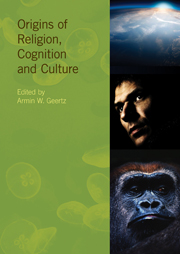Book contents
- Frontmatter
- Contents
- Contributors
- Introduction
- Part I EVOLUTIONARY SCENARIOS
- 1 Whence religion? How the brain constructs the world and what this might tell us about the origins of religion, cognition and culture
- 2 Why “costly signalling” models of religion require cognitive psychology
- 3 The prestige of the gods: evolutionary continuities in the formation of sacred objects
- 4 The evolutionary dynamics of religious systems: laying the foundations of a network model
- 5 Art as a human universal: an adaptationist view
- 6 The significance of the natural experience of a “non-natural” world to the question of the origin of religion
- 7 Religion and the emergence of human imagination
- 8 The origins of religion, cognition and culture: the bowerbird syndrome
- 9 The will to sacrifice: sharing and sociality in humans, apes and monkeys
- 10 Apetales: exploring the deep roots of religious cognition
- Part II COGNITIVE THEORIES
- Index
4 - The evolutionary dynamics of religious systems: laying the foundations of a network model
from Part I - EVOLUTIONARY SCENARIOS
- Frontmatter
- Contents
- Contributors
- Introduction
- Part I EVOLUTIONARY SCENARIOS
- 1 Whence religion? How the brain constructs the world and what this might tell us about the origins of religion, cognition and culture
- 2 Why “costly signalling” models of religion require cognitive psychology
- 3 The prestige of the gods: evolutionary continuities in the formation of sacred objects
- 4 The evolutionary dynamics of religious systems: laying the foundations of a network model
- 5 Art as a human universal: an adaptationist view
- 6 The significance of the natural experience of a “non-natural” world to the question of the origin of religion
- 7 Religion and the emergence of human imagination
- 8 The origins of religion, cognition and culture: the bowerbird syndrome
- 9 The will to sacrifice: sharing and sociality in humans, apes and monkeys
- 10 Apetales: exploring the deep roots of religious cognition
- Part II COGNITIVE THEORIES
- Index
Summary
This chapter aims at laying the foundations for the study of religions as systems, which would enable scholars to produce formalized and quantitative explanations and predictions about the inner causal structure and possible developmental tracks of religions. Whereas the notion of a “system” has been formerly used in connection with culture and its various aspects (cultural systems, symbol systems, thought systems, belief systems and even ritual and religious systems), these accounts have not been based on a shared, formal, let alone mathematical, definition of systems and did not therefore provide scholars with appropriate tools to develop quantitative explanations and predictions about culture or religion.
Frustrated by the loose, metaphorical and ultimately not very productive talk about ‘systems’ in cultural studies, sceptics have recently raised their voices against too easily presuming the existence of systems where there might be none. For example, Pascal Boyer (1994: 229) has written about the false “theologism” that takes the existence of connections among religious assumptions for granted. Benson Saler (2001, 2005; and personal communication) has argued that beliefs do not constitute a system, because there are apparently numerous beliefs that we can remove from the set of an individual's or culture's beliefs without affecting any other belief. Cognitive anthropologist Roy D'Andrade suggested that culture is a collection of units, rather than an “entity”. Cultural items in the minds of people do not constitute “a thing” because they are lacking “entitativity”.
- Type
- Chapter
- Information
- Origins of Religion, Cognition and Culture , pp. 98 - 120Publisher: Acumen PublishingPrint publication year: 2013



